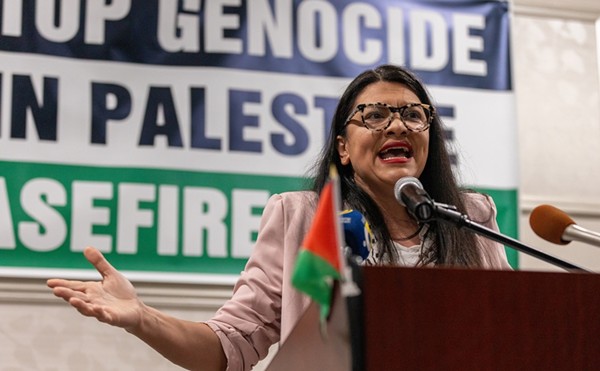PUTTE, Belgium — It’s a quiet winter evening in a small village about 30 miles north of Brussels, where Nabil Sayadi and his wife, Patricia Vinck, live with their four children.
Sayadi, who was born in Lebanon, sits at the dining room table with his 1-year-old daughter, Rouqayah, on his lap.
Omer, their eldest child, is stretched out on a sofa, reading the latest adventures of Harry Potter.
A Flemish translation of the “Sesame Street” theme song hums from a stereo in a corner of the 100-year-old home. Their son, Younes, gently bounces to the tune.
Vinck has just finished bathing her youngest boy, Yassine, who dashes naked past his father. “Moulin Rouge!” says Sayadi, a joking reference to the risqué Hollywood film.
Sayadi sets down Rouqayam and dresses Yassine for bed.
It’s a typical night of domesticity for this family, which has lived in the farming community about five years. But their tranquility is clouded by an uncertain future.
Last year, the United Nations added the Muslim couple to its list of individuals “belonging to or associated with al Qaeda.” The Belgian government has frozen their bank account and they are barred from leaving the country.
Vinck and Sayadi, who vehemently deny any terror ties, say they learned their names had been added to the list from a reporter who called them at home seeking a response.
“I said, ‘What do you mean? …’” recalls Vinck. “I had him fax me the list. When I see it, the room went black.”
The couple knew the Belgian government had been investigating them, but they never expected to wind up on the UN list.
The ordeal began on Dec. 14, 2001, when U.S. authorities shut down the Islamic charity Global Relief Foundation (GRF) for alleged terrorist ties. That same day, Rabih Haddad, a founding member of GRF, was arrested at his Ann Arbor home. Haddad was jailed 19 months before he was deported last year to Lebanon for a visa violation (“Haddad breaks his silence,” Metro Times, March 17). His family was deported shortly thereafter.
Sayadi, a friend of Haddad’s, was director of GRF’s now defunct European branch, Foundation Secours Mondial (FSM). Vinck served with no pay as FSM’s secretary.
After the U.S. Treasury Department shuttered GRF, the Belgium office, which received about half of its funding from GRF in Chicago, could not continue operating. Other GRF offices around the world also were shut down. Ironically, Sayadi’s Belgium citizenship was approved after GRF was shut down. In October 2002, the Treasury Department designated GRF and FSM “global terrorists,” which prevents the groups from having foreign bank accounts. Sayadi and Vinck also are on the Treasury Department list of suspected terrorists.
“It is difficult, because we had a normal life,” says Vinck. “We lived peacefully. …”
They have been the subjects of intense media attention worldwide.
Money has been tight since Sayadi stopped working for the nonprofit. The government denied him unemployment benefits. He recently was let go from a part-time job at a friend’s clothing store; his final day is the end of this month.
“In the beginning, we sent a letter to the United Nations and European Community and they said you are on this list because of the Belgium government,” says Sayadi.
He says he has asked Belgium to have their names removed from the UN list, to no avail. He says the Belgian government has not even explained why they are on the list.
Sayadi and Vinck have not been criminally charged. Belgian Judge Damien Vandermeersch (who functions much like a federal prosecutor) investigated the couple and declared there was no evidence warranting criminal charges, Georges-Henri Beauthier, who represents Sayadi and Vinck, says in an e-mail to Metro Times.
No criminal charges have been brought against GRF, FSM or any of its officers.
Sayadi and Vinck are mystified as to why they are the only GRF officers whose names appear on the UN and Treasury Department terrorist lists.
“We are glad there are no others on the lists,” says Sayadi. “But why are we on the lists? Why is my wife on the lists? Not even Osama bin Laden’s wife is on the lists.”
Vinck is one of only two women on the UN list for ties to al Qaeda.
Also missing from the lists is Muhammed Galeb Kalaje Zouaydi, a Syrian man who was indicted last year in Spain for allegedly distributing hundreds of thousands of dollars on behalf of al Qaeda. Zouaydi donated about $130,000 to GRF’s Belgium office, according to Sayadi, who calls Zouaydi a friend; Sayadi says he doesn’t believe Zouaydi is a threat to anyone.
The UN Security Council Committee tells Metro Times via e-mail that it cannot disclose why individuals are included on the list. The U.S. Treasury Department says it cannot comment.
Sayadi and Vinck suspect that Belgium placed their names on the list to appease the United States, that it was trying show it is tough on terrorism. The couple is very critical of American foreign policy, but insist that they would never harm anyone or assist anyone who would.
Last year, Belgium Prime Minister Guy Verhofstadt announced on a national news program that he would see that the couple’s names were removed from the UN list. But that hasn’t happened.
Last month, Sayadi and Vinck sued Verhofstadt and the Belgian government in an attempt to force the removal of their names.
Laugh or die
Farmland stretches along a narrow road that runs past the couple’s home. Sayadi and Vinck have a small vegetable garden, as well as geese, chickens and two sheep.
They say they moved from Brussels to Putte to escape the noise and congestion of the city. Their community is made up of about 5,000 families; they are the only practicing Muslims, says Vinck.
“My opinion is if you have something to hide you can’t live here,” says Vinck, who explains that everyone knows each other’s business.
But she and Sayadi don’t mind. They like knowing their neighbors, which wasn’t the case in Brussels.
And they appreciate how the community has supported them through their ordeal. When the media reported that their names had been added to the terrorist list, the couple was apprehensive about sending their children to school. They feared that their kids would be ostracized or worse.
“I was very afraid the parents wouldn’t allow our children to play with their children. But when we go to school, everyone is waiting for us,” says Vinck, referring to the schoolchildren and their parents. “I cried.”
So far, the family has suffered little backlash. They say a few people are afraid to associate with them, but that most of Putte’s residents have been supportive. When they could not pay rent because of their closed bank accounts, the landlord allowed them to pay late. A pharmacist did the same.
But the closing of FSM has caused economic hardship.
“We lived well without being rich,” says Vinck. “Now, we live very difficultly. I am afraid if my children are sick and have to go to the doctor; I can’t pay it. I can’t go to the dentist this year.”
As director of FSM, Sayadi earned about $17,000 a year. After he lost his job, he worked irregular hours for a clothing store owned by his friend. But his job ends this month. Sayadi says the Austrian and Australian governments questioned his friend who recently traveled to those countries and doesn’t want any more trouble. “They asked about me,” says Sayadi. Vinck and the children receive some government aid.
To lift their spirits, Sayadi and Vinck often joke about their circumstances.
“If we don’t laugh, we die,” says Sayadi.
After Vinck prepares dinner, she pushes Sayadi’s chair to the table with him and Rouqayam in it.
“She is very strong,” says Sayadi, smiling.
“Yes, of course — I am al Qaeda,” says Vinck, who winks.
After GRF was shut down in the United States and abroad — and months before the couple was added to the terrorist lists — they were constantly followed by a convoy of four to six vehicles through their village.
“Very discreet,” says Vinck, sarcastically.
Initially, it frightened the family.
“If we take the kids to school, they follow us,” says Sayadi.
But they also turned that into a joke.
“I begin to play with them,” says Sayadi. “When I drive home, I take small country roads and make 180-degree turns and they would follow. It was really obvious.”
The couple suspects their phones are tapped.
“I always insult them,” says Vinck of possible eavesdroppers.
Relief work
Vinck was born in Belgium and raised Catholic. She converted to Islam in 1986. She says she had questions that neither her parents nor Catholicism could answer.
“So, I started to look for myself and began reading,” says Vinck.
Sayadi was born in Lebanon, but left in 1985 because of the 17-year civil war. He went to Greece, where he was trained as a dental technician.
“My mother was very happy for me to leave, my father too,” says Sayadi, who became a devout Muslim when he was about 16. His parents were Muslims, but did not practice the faith, he says.
In December 1986, he left Greece for Belgium. There he met Vinck, who was married at the time.
Sayadi had hoped to stay in Belgium and applied for political asylum. It was denied in 1989.
Sayadi went to Pakistan to help Afghan refugees during the Russian invasion of Afghanistan — efforts that at one time had the full blessing of the U.S. government.
While in Pakistan, he met Rabih Haddad, who was working for a relief organization and hired Sayadi to take photos for its newsletter.
He also learned from a friend that Vinck’s husband had left her. Sayadi wrote Vinck to give his condolences, which prompted correspondence and phone calls between the two. In 1992, Vinck went to Pakistan to marry Sayadi, and the couple returned to Belgium together.
“So in Pakistan, I married a Belgian girl,” says Sayadi.
Until 1995, Sayadi had various jobs, including driving a cab. Vinck worked for a car leasing company until they had their first child.
Sayadi had hoped to start a humanitarian organization to continue helping the Afghan refugees and others.
“But I didn’t have any money or know-how to begin,” he says.
At the time, Sayadi, who loves movies and regularly makes references to them, saw two or three a week. He loves the Star Wars series and most films with Robert De Niro and Al Pacino. To save money, he says, he cut back to three movies a month.
“If I see only three a month I could help two families in Afghanistan,” he says.
He attempted to raise money in Belgium, but had little success.
In 1994, Sayadi contacted Haddad about starting a European branch of GRF. Haddad says he had been thinking the same thing. Sayadi opened the Belgium office at the couple’s Brussels apartment the next year — it was later moved to their village home. The organization focused primarily on aid to refugees in the war-torn Balkans.
Sayadi says he would submit proposals to GRF for projects and, if they were approved, the organization would finance it. The most extensive projects, in Kosovo, included a medical clinic and vocational school where women were taught computer programming, sewing, English and Arabic and the Koran.
Between 1995 and 2001, a total of $1.6 million funded the organization, with about half of that coming from GRF in Chicago. The remainder Sayadi raised in Belgium and other countries.
But shortly after the terror attacks of Sept. 11, 2001, GRF was shut down in the United States and abroad.
Uncertain future
Many allegations have been made against GRF and its members. As is the case with Haddad, Sayadi has come under suspicion for relationships with people that the United States had no objections about at the time. When Muslims were resisting the Soviets, even people like bin Laden were considered allies.
Chief among the allegations against Sayadi is his relationship to Zouaydi and another Syrian, Mamoun Darkazanli, both of whom were indicted last year in Spain for allegedly distributing hundreds of thousands of dollars on behalf of al Qaeda.
Sayadi says he first spoke to Zouaydi by phone around 1991. He says Zouaydi’s brother had died during military training when the Russians occupied Afghanistan. “I was in contact with him to tell him where is the grave of his brother,” says Sayadi.
The men remained in touch when Sayadi returned to Belgium. Zouaydi was a wealthy businessman and Sayadi solicited donations from him for FSM.
“He was very enthusiastic,” he says, adding that the men became good friends.
“When he came to live in Spain, we visited each other. I went to Spain twice and he came here twice,” says Sayadi.
When in Albania, Sayadi met Darkazanli, who also was supportive of the relief organization.
The two men drove to Kosovo with Sayadi around 1999 to deliver an ambulance.
“I bought an ambulance [for the Kosovo clinic] and needed someone to drive it,” says Sayadi, adding that he does not believe either man supports al Qaeda.
Another accusation against Sayadi and GRF are communications with Wadih el Hage, who was bin Laden’s personal secretary and is now serving a life sentence in connection with the bombings of U.S. embassies in East Africa in 1998.
Sayadi says between 1995 and 1997, el Hage called him to ask GRF to assist him with a project to reduce mosquitoes and therefore stem malaria in Africa. But Sayadi declined, telling el Hage that the group did not have funds for the project.
GRF sued the U.S. Department of Treasury in U.S. District Court for the Northern District of Illinois in 2002 for using secret evidence against it. The lawsuit is still pending.
An affidavit Sayadi filed in that case states that his phone records indicate he called el Hage three times between 1995 and 2001.
“These telephone calls were mainly about the above-referenced malaria project in Kenya,” wrote Sayadi, who met el Hage in Pakistan around 1991 and again about six years later in Germany and Brussels. He says el Hage tried to interest him in a business venture involving the sale of spices and tea, but Sayadi declined.
“I never gave him money or took money [from him],” Sayadi says of el Hage.
Sayadi vehemently denies supporting terrorism or discussing terrorist acts with el Hage.
Despite the allegations hanging over his head — they have been reported worldwide — Sayadi believes his family’s troubles will subside.
“I see this as a problem we are facing and it will pass,” says Sayadi, who hopes to one day resume his humanitarian quest.
“I will try to educate my sons on this way of life,” he says. “To teach them that there are people that don’t have TV, they don’t have video games, they don’t have drinking water.”
Vinck is not so optimistic.
“I am not Belgian any more. How can I feel at home if my own government doesn’t protect me from all these lies?” she asks. “I have faith in God and justice will come over the world, but maybe not in my lifetime.”
Ann Mullen is a Metro Times staff writer. She can be reached at (313) 202-8015 or [email protected]




